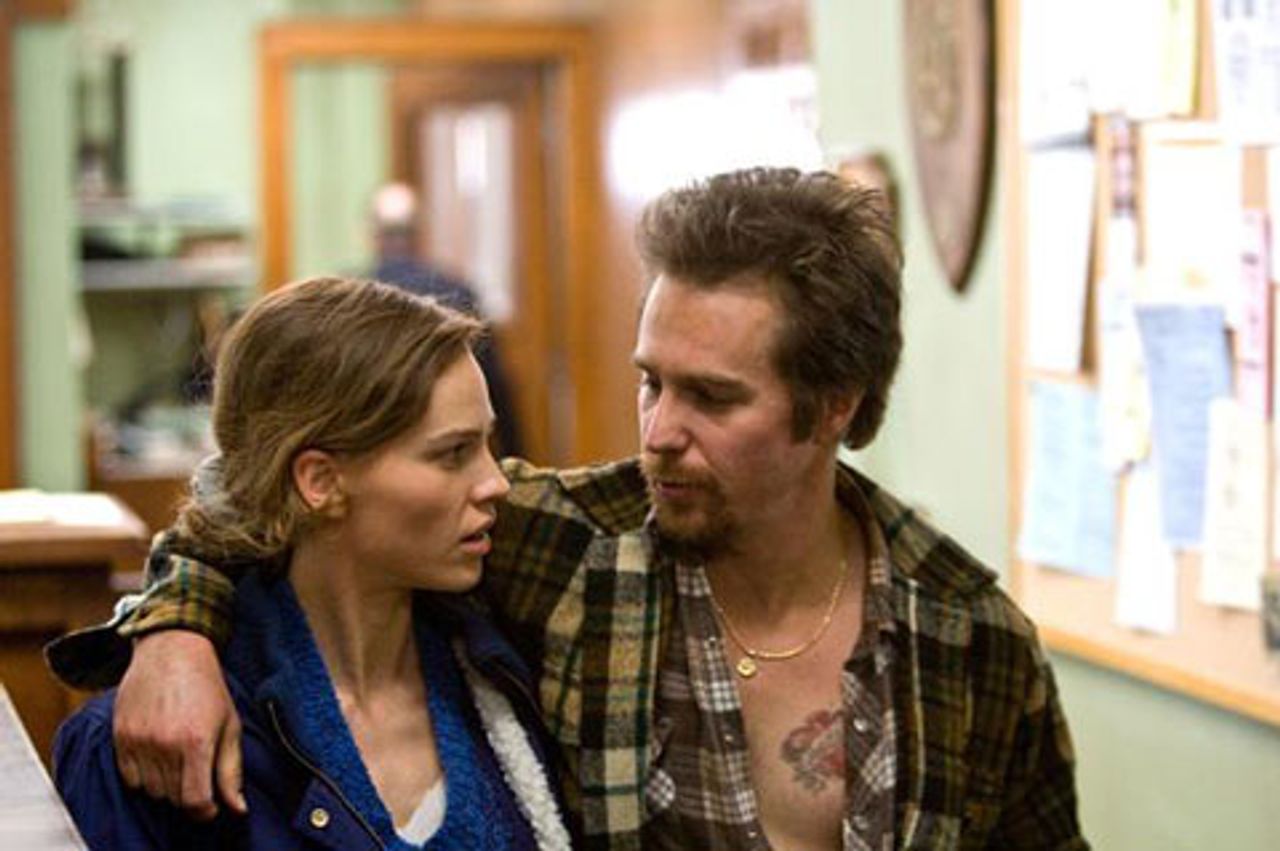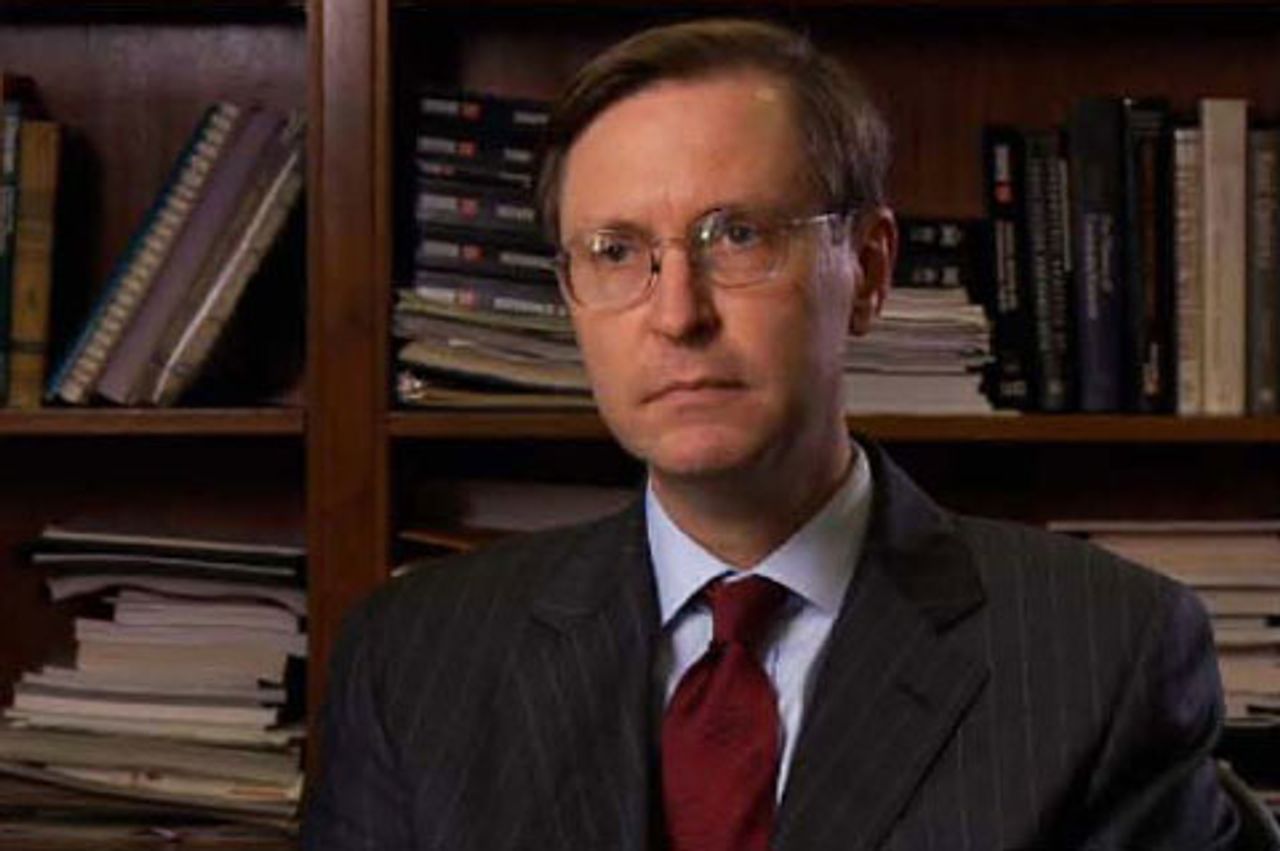A number of films that appeared at the 2010 Toronto film festival, and on which we commented, have opened in North America. We repost the comments today.
 Conviction
ConvictionConviction, directed by Tony Goldwyn (grandson of famed Hollywood producer and executive Samuel Goldwyn), is a serious drama. It recounts the 18-year battle by a woman to overturn the guilty verdict that sent her brother to prison for the 1980 stabbing death of a woman in Ayer, Massachusetts.
Betty Anne Waters, conscientiously portrayed by Hilary Swank, and her brother Kenny (Sam Rockwell) had a tough upbringing in small-town Massachusetts. Their intense bond and the injustices of the police and legal system (Kenny was framed by a vindictive cop, played by Melissa Leo) impel Betty Anne to earn a law degree against all odds, forfeiting much of her personal life.
Although the flashbacks of the siblings’ childhood are a bit clichéd, the film’s depiction of Betty Anne’s passionate crusade to exonerate Kenny is well done, generating a gripping, but balanced, momentum. Supporting actors Leo, Minnie Driver, Peter Gallagher and Juliette Lewis deliver performances that speak to the commitment of the cast to bring this case to light.
Waters worked with the Innocence Project, and through DNA testing, brought about her brother’s release from prison in 2001. (Tragically, Kenny Waters died six months later at age 47, having spent more than a third of his life in prison for a crime he did not commit.)
It’s Kind of a Funny Story
Based on Ned Vizzini’s semiautobiographical 2006 novel, It’s Kind of a Funny Story is the latest film from the interesting writing and directing team of Ryan Fleck and Anna Boden (Half Nelson and Sugar). The movie follows a depressed and suicidal teen, Craig (Keir Gilchrist). He has been pushing himself to the point of “stress-vomiting” to get accepted into Executive Pro-Professional High School—“set up to create the leaders of tomorrow.” It’s an effort to please his businessman father, who is mostly consumed with “client crises.”
 It’s Kind of a Funny Story
It’s Kind of a Funny StoryAfter nearly throwing himself off the Brooklyn Bridge, Craig goes to the emergency room of a city hospital in search of an antidepressant or a sedative. Instead, he is admitted to the psych ward, where he meets a collection of likable and even intriguing patients, who help shine a light on his problems. The institution itself is no doubt a sanitized version of the real thing.
Nonetheless, in black comedy style, the film sweetly tackles a serious subject matter. It is enhanced by the performance of Zach Galifianakis as Bobby, who has attempted suicide six times and routinely checks himself into the hospital for a “vacation, the way some people go to the Hamptons.” He is fond of reciting Bob Dylan lyrics, including “He not busy being born is busy dying,” and claiming them as his own.
The film accesses certain feelings about the real personal and social pressures weighing down on young people, who confront, among other things, “two wars and a messed-up society.” Also “undergoing renovations” are a self-harming teenage girl (Emma Roberts), an alienated Egyptian immigrant and a black radical academic from a prestigious university who “went bonkers after the passage of the Patriot Act.” Jeremy Davies as a hip staff member also adds color.
Craig’s reinventions of reality serve to reinforce some of the film’s concerns. This is especially the case with the patients’ glittery performance (in his head) of the 1980s hit song from Queen “Under Pressure,” featuring lyrics such as “She been around/Kicked my brains around the floor/These are the days it never rains but it pours.”
Inside Job
Inside Job by American documentarian Charles Ferguson (No End In Sight) is a valuable, detailed account of the global financial meltdown in September 2008. Estimating the cost at over $20 trillion, with millions of people pauperized globally, the filmmaker asserted at the movie's question-and-answer session in Toronto that the “American people will be paying for this for a long time to come.” He further argued that another crash of similar dimensions was looming on the horizon.
 Glenn Hubbard interviewed in Inside Job
Glenn Hubbard interviewed in Inside JobNarrated by Matt Damon, the documentary employs archival footage, graphs and charts, as well as dozens of talking heads—mostly bourgeois economists, who range from supportive to hostile to the exposé. It argues that the Obama White House bears as much responsibility as the previous Bush administration for an increasingly criminal financial sector.
According to Inside Job’s production notes, progressive deregulation since the 1980s led to crises that augmented in severity. But due to the financial industry’s swelling power and wealth, a decreasing number of people have been held accountable. In the case of the 2008 crisis, “nobody has gone to prison, despite fraud that caused trillions of dollars in losses.”
A mass of material about the entrenched, socially-destructive operations of the financial elite and their Democratic and Republican agents does not deter Ferguson from drawing the false conclusion that the financial collapse “was a completely avoidable crisis,” if only there had there been more regulation and a better caliber of people at the helm. “We can all agree,” says Ferguson, “on the importance of restoring honesty and stability to our financial system, and of holding accountable those who destroyed it.”
This is to avert one’s eyes from the objective, historic and systemic character of the collapse. Commentators such as this never ask themselves how and why these astonishing changes took place. Did the US ruling elite suddenly lose its marbles? Why did the caliber of people decline so? Might it not have had something to do with the narrowing options left open to a crisis-ridden system?
The film’s strongest feature is the exposure and indictment of academia for its corruption and servitude to corporate America. Most notable in the pack is Glenn Hubbard, the current dean of Columbia University’s business school. As the chief economic advisor to the Bush administration, he was instrumental in the design of the 2003 tax cuts for the rich. He is on the board of Met Life, was previously on the board of Capmark, and, according to the production notes, is a staunch advocate of the deregulation of financial services.
